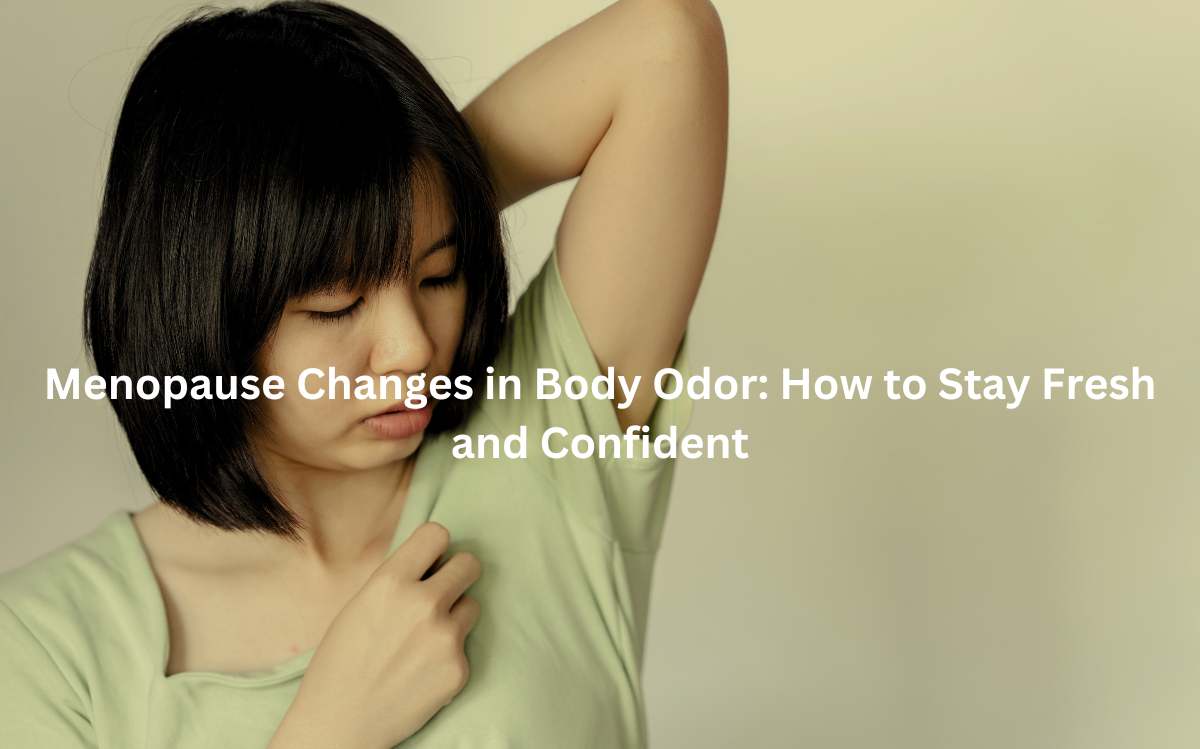Learn how menopause affects body odor and discover practical tips to manage changes while feeling confident.
Menopause brings hormonal shifts that can alter body odor, from increased sweating to changes in skin bacteria. But with simple lifestyle adjustments and effective solutions, these changes can be managed with ease. (1)
Key Takeaway
- Hormonal changes during menopause can increase sweating and alter body odor, but it’s manageable.
- Practical steps like choosing breathable fabrics, improving hygiene, and adjusting diet can significantly help.
- Healthcare guidance and targeted products provide additional support for persistent odor concerns.
Hormonal Changes and Body Odor
Menopause brings a series of hormonal shifts, and one of the unexpected side effects is a change in body odor. As estrogen levels drop, the apocrine glands—the sweat glands responsible for body odor—become more active. This results in:
- Increased sweating, particularly during hot flashes and night sweats.
- Sweat composition changes, which can contribute to a stronger scent.
These changes can be alarming, but there’s more to the story. Hormonal fluctuations also affect the skin’s microbiome, which refers to the bacteria that break down sweat. The changes in these bacteria can lead to:
- More intense odors as the bacteria respond differently to the sweat produced.
Hot flashes and night sweats, which are common during menopause, only exacerbate the issue. These episodes lead to sweat buildup and moisture, which can cling to clothing and skin. As a result, odors may become more noticeable.
By understanding this connection between hormonal shifts and body odor, women can better manage the changes they’re experiencing.
While the odor is often temporary, it can impact confidence and daily comfort. Addressing the root causes of the issue can help women regain control over their bodies, making the menopause transition a little easier.
Common Body Odor Concerns During Menopause
One of the primary concerns many women face is vaginal odor, which results from a combination of hormonal and bacterial changes during menopause. (2)
The drop in estrogen can lead to thinning of vaginal walls, which in turn can alter the natural balance of bacteria. This change might cause unpleasant smells that can be uncomfortable and difficult to manage.
Another issue that comes with menopause is persistent sweat. Hot flashes and night sweats can cause excessive perspiration, leading to a constant feeling of dampness and odor. The moisture from sweat can also affect the skin’s pH level, contributing to a stronger odor.
Interestingly, some women experience an altered sense of smell during menopause. Hormonal fluctuations can affect the olfactory system, making it harder to perceive or identify certain odors.
This shift can make some women feel self-conscious, as they may not even realize they have developed a stronger odor. Managing these changes involves a multi-faceted approach, including lifestyle adjustments and sometimes medical treatments.
Managing Body Odor: Daily Practices

A consistent hygiene routine is one of the most effective ways to manage body odor during menopause. Here are a few tips for keeping things under control:
- Regular bathing: Use antibacterial soaps to help reduce the bacteria that break down sweat, which is key to managing body odor.
- Shower after hot flashes or night sweats: If possible, rinse off to prevent sweat from lingering and building up on the skin.
Breathable fabrics also play a crucial role. Choose fabrics like cotton, which allow the skin to breathe, reducing sweat and moisture buildup. On the other hand:
- Avoid synthetic fabrics: These trap heat and moisture, which can worsen body odor.
- Loose-fitting clothing: Opt for layers that can be easily removed when feeling overheated.
In addition to hygiene and clothing, using effective deodorants and antiperspirants can make a big difference. Consider the following:
- Antiperspirants with aluminum compounds: These help block sweat glands, reducing perspiration.
- Deodorants: While they don’t stop sweat, they can neutralize odors.
Some products are specially formulated for menopausal women, offering longer-lasting protection for the unique challenges this stage brings.
Dietary Adjustments to Reduce Odor
What you eat during menopause can have a direct impact on body odor. Certain foods can exacerbate the smell of sweat, such as spicy foods, caffeine, and alcohol. These foods can increase the production of sweat and interact with the body’s natural scent. Avoiding these triggers or limiting their intake may help reduce the intensity of body odor.
On the other hand, incorporating probiotics into your diet can support a healthy gut microbiome, which may, in turn, positively impact the skin’s microbiome. Eating a balanced diet rich in fruits, vegetables, and fiber helps regulate the body’s systems, including sweat production. Staying hydrated is another important factor—drinking enough water helps flush toxins out of the body, which can help reduce the strength of body odor.
By making these small adjustments to your diet, you can have a positive impact on both your overall health and how you feel about your body during menopause.
Medical and Non-Medical Solutions
Hormone Replacement Therapy (HRT) is one of the most effective treatments for managing menopause symptoms, including body odor. By stabilizing hormone levels, HRT can:
- Reduce hot flashes and night sweats: This lowers the amount of sweat produced, which can help minimize body odor.
However, HRT isn’t suitable for everyone, so it’s important to discuss the benefits and risks with a healthcare provider before starting treatment.
For women who prefer natural remedies, the following options may help:
- Sage supplements: Known for their potential to balance hormones.
- Essential oils: Lavender and tea tree oil are often suggested to reduce sweating and improve scent.
While these remedies can be a gentle alternative, they may not work for everyone.
If body odor persists despite lifestyle changes, it might be time to consult a healthcare provider. They can recommend options like:
- Prescription-strength antiperspirants
- Different forms of HRT
These treatments could be more effective in managing symptoms.
Mental Health and Body Image
The physical changes during menopause, including body odor, can have a significant impact on mental health. Many women experience a decrease in self-esteem and confidence due to the way their bodies are changing. This is especially true when body odor becomes a noticeable issue that affects daily life and social interactions.
Feelings of anxiety and self-consciousness are common during menopause, particularly when it comes to body odor. Women may avoid certain social situations or feel embarrassed in close-contact scenarios due to their new scent. These emotional responses can make the situation feel even more challenging.
Talking openly with healthcare providers, friends, or support groups can help alleviate some of the stress and discomfort. Understanding that these changes are a normal part of the menopause process—and that they are manageable—can go a long way in improving mental well-being.
Products and Tools for Odor Management
There is a wide range of products available for women looking to manage body odor during menopause. Menopause-specific deodorants, body washes, and wipes are designed to handle the unique needs of menopausal skin, providing extra protection against sweat and odor.
These products often include ingredients like aloe vera, witch hazel, and other soothing agents to keep skin comfortable while effectively controlling odor.
Clothing designed for moisture-wicking and temperature regulation is also a valuable tool in managing sweating. These garments are made from materials that draw moisture away from the skin, helping to keep it dry and reduce odor. For women who are on the go, portable products such as deodorizing wipes and travel-sized antiperspirants can provide quick relief during the day.
Conclusion
Managing body odour during menopause can be tricky, but it’s manageable with the right approach. Hormonal changes, like the decrease in oestrogen, affect sweat and scent, leading to more noticeable odours. Regular hygiene, breathable fabrics, and the right antiperspirants can help reduce sweating.
Dietary changes, such as cutting back on spicy foods and caffeine, may also alleviate issues. Hormone Replacement Therapy (HRT) or natural remedies can help balance hormones, while consulting a healthcare provider can offer personalised solutions.
Addressing the emotional impact through open conversations can also help ease anxiety and improve confidence during this transitional time.
If body odour is affecting your confidence, book a personalised consultation with Modern Menopause today for expert care: Book your consultation.
FAQ
What causes body odor changes during menopause?
During menopause, hormonal changes, particularly the drop in oestrogen levels, can cause significant changes in body odor. Women experience an increase in apocrine sweat gland activity, which leads to stronger body odor. Hot flushes and night sweats can also contribute to these changes.
Additionally, stress and anxiety can trigger stress sweat, which may worsen body odor. Managing menopause and body odor may involve staying hydrated, keeping good hygiene practices, and considering lifestyle changes for better control.
How can I manage body odor during menopause?
To manage body odor during menopause, focusing on hygiene practices like regular showers, especially after hot flushes, is crucial. Staying hydrated, wearing breathable fabrics, and avoiding synthetic materials can help manage sweating and body odour.
Using effective deodorants and antiperspirants can control odor. Managing stress and using relaxation techniques also help reduce stress sweat, which can worsen body odor. Women should consult a healthcare professional if body odor changes persist.
Can stress affect body odor during menopause?
Yes, stress and anxiety can lead to stress sweat, which can increase body odor during menopause. The apocrine sweat glands, responsible for body odors, are more active during stressful situations.
Managing stress through relaxation techniques and maintaining good hygiene can help control stress sweat and reduce body odor. If stress sweat becomes overwhelming, discussing symptoms with a healthcare professional may offer more targeted solutions.
How does menopause affect vaginal health and body odor?
Menopause and changes in oestrogen levels can affect both vaginal health and body odor. As oestrogen levels drop, vaginal dryness and discomfort may occur. At the same time, changes in sweat production from apocrine sweat glands can cause stronger body odor.
Women should maintain good hygiene practices and stay hydrated to manage both vaginal health and body odor. Vaginal estrogen may help alleviate dryness while also improving overall well-being during menopause.
How does staying hydrated help with body odor during menopause?
Staying hydrated is key for managing body odor during menopause. Proper hydration helps maintain the skin’s health, which supports good bacteria that regulate body odor. Dehydration can exacerbate body odor changes, making it stronger.
Drinking enough water can also flush toxins out of the body, reducing the intensity of odor changes. Staying hydrated, alongside other lifestyle changes, can help manage body odor more effectively during menopause.
References
- https://www.health.harvard.edu/womens-health/why-has-my-natural-scent-changed-during-perimenopause
- https://pmc.ncbi.nlm.nih.gov/articles/PMC10247921/

Leave a Reply